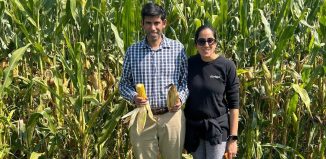Tom Butcher of BNL and the high cost of energy
Working to lower heating bills, pollution and dependence on foreign oil
Tom Butcher doesn’t just stand around at the water cooler and complain every time he gets a heating oil bill — he’s doing something about it. The head of the Brookhaven National Laboratory’s Energy Resources Division, Butcher is conducting the kind of research he hopes will lower our heating oil bills, create less pollution, and reduce our dependence on foreign oil.
For starters, he is working on ways to displace import petroleum with domestic biodiesel. As it stands now, fuel that heats our homes can have 5 percent biodiesel — or fuel made from substances like soybeans and waste from restaurants. Butcher has his sights set on a much higher target.
“The legal definition of heating oil has changed so that it can have as much as 5 percent biodiesel,” Butcher explained. “Getting that done was a big step. Where our research is focused is on increasing that limit and going well beyond it. From a technology perspective, there are some challenges in doing that.”
Butcher and his colleagues at BNL and his counterparts at Stony Brook have been examining numerous technological hurdles. One of those. Butcher said, is looking at the reliability and safety of existing equipment designed to house oil-based fuels when liquid fuels, including fuels from soybeans and waste oils pass through them.
The “rubbers in a pump shaft may degrade and lead to leaking components,” Butcher said. “The key issue” in raising biofuel content is that there is a “lack of experience in some important areas, including the compatibility of field materials, including elastomers and rubbers,” Butcher said.
Butcher is also interested in examining how to reduce pollution and improve the efficiency of burning wood as a heat source.
“In rural New York state, wood burning is the number one source of air pollution,” he warned. “On the track we’re on, [wood burning] threatens to become a dominant source of air pollution in the Northeast.”
Burning wood is something consumers generally warm to because it “puts people to work and is a renewable energy source,” Butcher described. “A lot of our work is focused on how to burn wood cleanly. How do you develop test methods that can accurately capture the performance of the currently available leading-edge wood conversion combustion technology?”
Butcher is examining the effectiveness of electrostatic precipitators, which use a high-voltage field across the exhaust gas, where captured particles migrate to a wall, fall down and get removed. He is also examining heat exchangers that can be used to condense water vapor from the exhaust gas and wash the particles out.
“If we are going to continue to use wood for heating, this is a road we have to go down,” Butcher insists. “I don’t think we’re going to have a choice.”
The BNL investigator said there are already technologies on the market that are much better than the average pellet burners, some of which keep fuel from smoldering, especially during periods when a house doesn’t need heat. A key to this system is thermal storage, where systems run at their optimal condition and charge the storage. The stored energy can heat the home while the burning system is off.
Butcher and his wife Donna, who works in a dental office and as a real estate agent, have raised four children who have all shown interest in technical fields. Their eldest, Kim, is an aerospace engineer who works for NASA on the technology for future space travel. Matt is working on his Ph.D. in biology at Eastern Virginia Medical School and is focused on heart disease. Jon will complete his doctor of pharmacy degree at Long Island University at the Brooklyn campus in just over a year and is, in the words of his father, “a fanatic fisherman.”
Not to be outdone, Jamie, who worked at BNL last summer on radiation detectors, is at Geneseo and “will undoubtedly develop a career that involves something technical in collaboration with something international.”
As for Tom Butcher, who lives in Port Jefferson with Donna, the common theme for the work he’s tackling now is “given the high price of oil, what do we do?”






